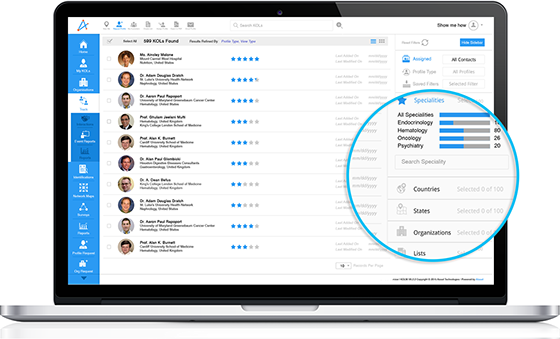23-07-2024
Transforming Pharma-HCP Interactions: Strategies for Success

The importance of engaging HCPs (Healthcare Professionals) cannot be emphasized enough for the success of Life sciences teams. However, developing effective communication strategies is equally necessary to drive this relationship and achieve the desired outcomes. HCP engagement essentially involves pharma companies connecting with HCPs for various objectives. At the basic level, it could involve pharma reps connecting with physicians to share the latest information on drugs, treatment protocols, clinical pipelines, and more.
In this article:
However, the effectiveness of their interactions depends on the value, timeliness, and relevance of the information the pharma teams provide. Traditionally, reps visit would involve unscheduled office drop-ins with the hope of catching an HCP's attention. However, the pandemic accelerated a shift towards virtual interactions, allowing these engagements to occur on an HCP's schedule and through digital platforms.
Also, HCPs prioritize patient care, so they value collaborations that enhance their medical knowledge and improve clinical outcomes. They are more likely to engage with companies that align with their professional goals and interests. Hence, when engaging with HCPs, it is crucial to share or demonstrate high-value content as it will serve as the solid foundation for building enduring partnerships.
Determining content that resonates with HCPs
According to a study, HCPs find the most value in content from journals, medical associations, and government websites. However, only one-third see the same value in pharmaceutical company content. This gap presents an opportunity for pharma companies to provide more medical content through various digital channels, such as virtual webinars with key opinion leaders (KOLs), virtual training on new therapies, and virtual speaker programs.
Pharma teams should structure communication flow by prioritizing medical content before brand marketing. This is especially true in case of product launches. By providing valuable medical information first, pharma companies can demonstrate their commitment to improving patient outcomes. This establishes a foundation of trust, making HCPs more receptive to subsequent brand marketing messages.
Additionally, HCPs are more likely to engage with and appreciate content that directly addresses their primary concern—patient care—before transitioning to product-specific information. This strategy ensures that the initial engagement is perceived as valuable and relevant, paving the way for more effective brand communication later.
Supplement traditional brand communications with unbranded content marketing that focuses on educational value. Foster collaboration between medical and commercial teams to ensure cohesive content strategies that resonate with HCPs. Co-creating content with key opinion leaders (KOLs) enhances credibility and relevance while maintaining consistency in communication and reinforces trustworthiness.
Enhancing Digital Presence
Investing in digital channels like webinars, eDetailing, and personalized email campaigns that offer valuable medical content is essential. These platforms not only increase engagement but also enhance the perceived value of your content among HCPs, facilitating meaningful interactions.
Recognizing that HCPs have diverse preferences and limited time, prioritize delivering content in formats that are convenient and accessible. Short-form content like brief videos and concise PDFs fits into busy schedules, while longer-form content provides in-depth insights. Balancing these formats ensures maximum engagement and effectiveness in conveying your message.
Using Diverse Modes of Interactions with HCPs
Video calls, live chat support, and virtual events are transforming how healthcare professionals, experts, and industry representatives interact in real time, regardless of their location. These platforms enable quick access to advice, facilitate insightful discussions, and provide access to specialized knowledge. Virtual interactions offer a convenient alternative to traditional face-to-face meetings, saving time and resources for everyone involved. Embracing these technologies fosters meaningful collaborations, facilitates knowledge sharing, and enhances professional networking opportunities among healthcare professionals.
Implement an HCP Engagement Platform
Implementing an HCP Engagement Platform can revolutionize how pharmaceutical companies identify and execute their engagement with healthcare professionals. A robust HCP Engagement software serves as a strategic tool for pharmaceutical companies. It allows them to streamline the identification of HCPs who are most relevant to their initiatives. This platform leverages advanced data analytics and profiling capabilities to discover HCPs based on specific criteria such as therapeutic expertise, geographic location, prescribing behavior, and research interests.
By utilizing such a platform, pharmaceutical companies can ensure that their interactions with HCPs are targeted and meaningful. It enables precise mapping of HCPs to particular medical activities, whether it involves clinical trials, advisory boards, scientific education programs, or collaborative research projects. This targeted approach not only enhances efficiency but also increases the likelihood of achieving desired outcomes from these engagements.
Moreover, an ideal software facilitates ongoing engagement management. It allows companies to track and analyze interactions with HCPs over time, gaining valuable insights into their preferences, feedback, and evolving needs. This data-driven approach helps in tailoring future engagements to better meet the expectations and requirements of HCPs.
However, finding a platform that wholly meets the life sciences team's needs, as well as the compliance standard from the sea of HCP engagement platforms out there, is a challenging task. That's where the konectar HCP Management Platform, powered by AI, stands crucial. It facilitates the identification and engagement of HCPs and provides valuable insights into healthcare landscapes.
This platform supports seamless interactions between pharmaceutical professionals and HCPs, enhancing collaboration and fostering informed decision-making across Medical Affairs initiatives. For more details on how konectar can help optimize your HCP engagement strategies, request a demo today!
FAQs
- Why is a medical-first approach essential for product launches?
A medical-first approach prioritizes medical content before brand marketing, helping to build trust and establish credibility. This approach is particularly important during product launches to ensure HCPs are well-informed and engaged from the outset.
- What role does an HCP Engagement Platform play in pharmaceutical communications?
An HCP Engagement Platform enables pharmaceutical companies to identify and engage with relevant HCPs more effectively. It uses advanced data analytics to identify HCPs based on therapeutic expertise, geographic location, and other criteria, optimizing engagement strategies.
- How can pharmaceutical companies enhance their digital presence for better HCP engagement?
Investing in digital channels such as webinars, eDetailing, and personalized email campaigns can significantly enhance digital presence. These platforms allow pharmaceutical companies to deliver valuable medical content efficiently, increasing engagement and interaction with HCPs.
- How can konectar help life sciences teams improve their engagement with HCPs?
konectar empowers life sciences teams to enhance HCP engagement by generating a readily mapped list of HCPs based on criteria such as therapeutic expertise, geographic location, prescribing behaviour, and research interests. The platform also comes replete with tools and features that help to execute effective communication with physicians. This targeted approach ensures that pharmaceutical companies connect with the most relevant HCPs for their initiatives.





